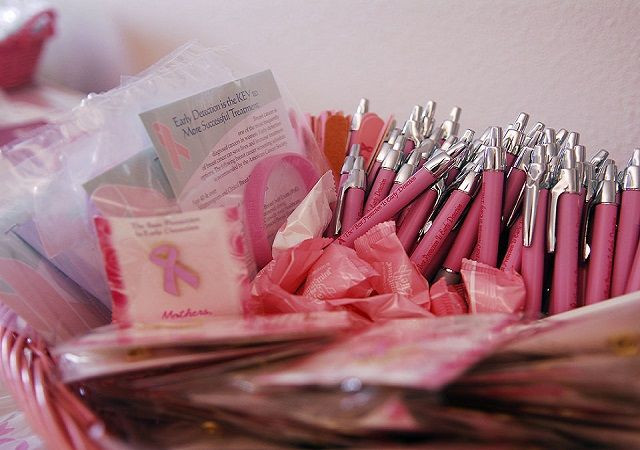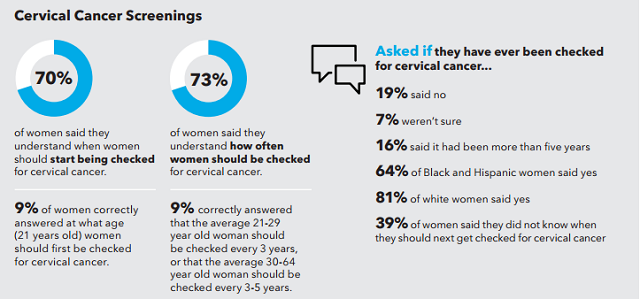Cancer Screening Tests For Women 2016: The Survey Questions Most Women Got Wrong

A new survey courtesy of Planned Parenthood finds that many women are unfortunately in the dark about the basics of breast and cervical cancer screenings.
The nonprofit organization teamed up with an independent research institution, NORC at the University of Chicago, to survey over 1,000 adult women across the country this past March. Among other questions, the women were asked about the age they should first get screened for either type of cancer and how often they should return for a follow-up. When it came to cervical cancer, around 70 percent of women said they knew the correct answer to each question, but only nine percent actually got it right for either. For breast cancer, it was even worse, with more than 80 percent saying they understood the correct time frames, but only four percent getting the first question right and 10 percent the second.
For both breast and cervical cancer, the age that an average woman should get their first screening is 21. With cervical cancer, follow-up screenings should happen every three years for women in their 20s, and every three to five years for women ages 30 to 64; with breast cancer, the rate of screenings should be every one to three years, depending on your family history. In particular for breast cancer, women often confused mammograms as the primary form of screening rather than physical breast exams. Thirty percent guessed the first screening should happen at age 40, which is actually the recommended age of the first mammogram, and 55 percent guessed that women under the age of 40 should receive both types of screenings.
“The survey shows that not enough women have accurate information about their recommended cancer screenings,” said Dr. Raegan McDonald-Mosley, Chief Medical Officer for Planned Parenthood Federation of America, in a statement. The survey is the first of its kind commissioned by the organization, which wanted to understand how much women understoood about cancer screenings given the updated recommendations issued by health agencies in recent years, according to Planned Parenthood spokesperson, Catherina Lozada.

Additionally, the survey demonstrated that a significant chunk of women haven’t gotten screened at all. Nineteen percent said they hadn't been checked for cervical cancer, compared to 16 percent who said the same about breast cancer. And 39 percent and 23 percent of women said they weren’t sure when they should next get screened for cervical and breast cancer, respectively. These gaps were especially pronounced among Black and Hispanic women, who were not only less likely to get screened, but expressed facing more barriers to proper health care.
For instance, 42 percent of Hispanic women and 32 percent of Black women said that financial cost made them wary of cervical cancer screenings, compared to only 18 percent of white women. Similarly, these women felt more fearful of the test and of the potential results than their white counterparts. The findings only reaffirm a steady stream of research showing the disparities of cancer care experienced by people of color.
“The unfortunate reality is that women of color in the U.S. face more barriers to accessing health care than white women, and so are less likely to get preventive screenings, more likely to be diagnosed at later stages, and more likely to experience worse health outcomes when it comes to breast and cervical cancer,” explained McDonald-Mosley. Sadly, less than half of the women were aware that the Affordable Care Act has now made all insurance policies cover both types of screening completely free of charge.
“Taking the best possible care of yourself can sometimes be hard,” said McDonald-Mosley. “Whether you’re confused about recommendations or worried about cost, Planned Parenthood is here for you.”
While the results are certainly lamentable, Planned Parenthood believes there’s plenty that can be done to confront these misconceptions head-on, including at home.
“The survey revealed that almost half of women have never encouraged other women in their lives to get screened for cervical cancer, one of the most preventable cancers when caught early,” said McDonald-Mosley. “We hope more women will talk with their loved ones — mother, siblings, aunts, cousins, partners, and friends — about the importance of getting screened for breast and cervical cancer. You can simply ask when the last time they had a check-up was — and if they aren’t going in for screenings, ask what’s preventing them from getting care.”
Source: National Survey of Women’s Knowledge of Recommended Screenings for Breast and Cervical Cancer. Planned Parenthood. 2016.
Read More:
For Cancer Screenings, When Do The Benefits Outweigh The Risks? Read here.
Ovarian Cancer Screening May Soon Be Conducted With A Simple Blood Test. Read here.
Published by Medicaldaily.com



























